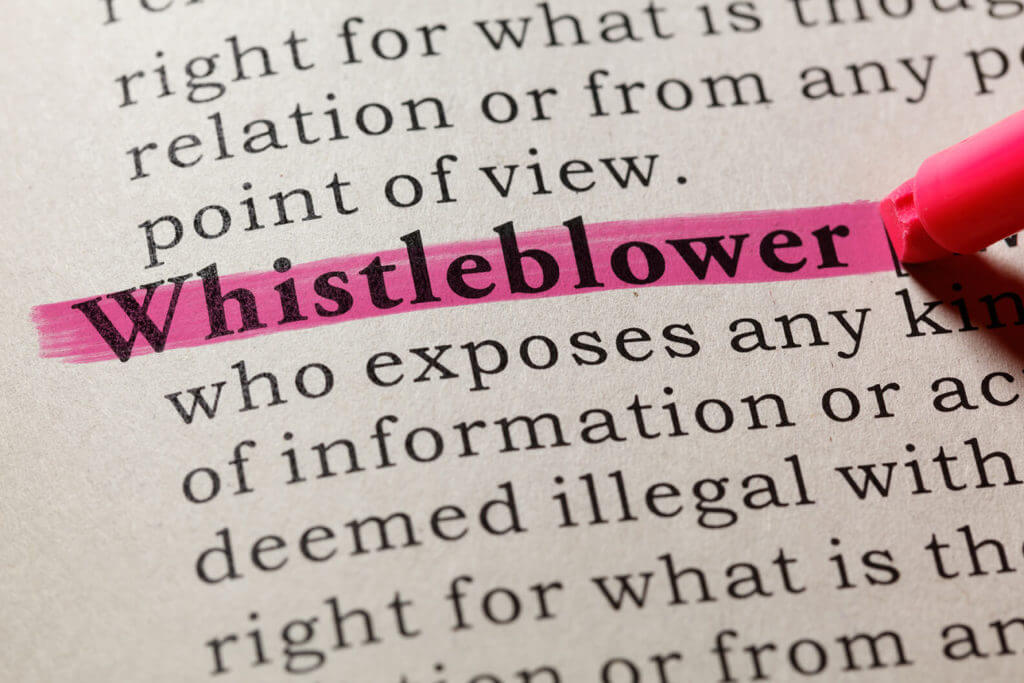Dec 17 2018
It is unfortunate, but true, that violations of the laws, regulations, and municipal ordinances occur in the workplace. These violations could transpire in any number of ways: by a rogue employee, by an employer’s directive, by lack of oversight from management — the list goes on. If you have observed any such violation, there are probably lots of thoughts swirling through your head. One of them, to be sure, is whether you should expose your employer’s (or your coworker’s) unlawful conduct, and what will happen to your job if you do.
An employee who reports his or her employer’s unlawful conduct is known as a whistleblower. Both federal and state laws prohibit employers from retaliating against employees who blow the proverbial whistle. But the way in which a whistleblower must assert his or her rights can be complicated. Here are some things to think about:
First, you may be protected under both federal and state law, depending on your employer’s industry and the nature of the violation. There are 22 federal statutes that protect whistleblowers from retaliation, and they are parsed out by the particular industry; the Department of Labor’s Occupational Safety and Health Administration (“OSHA”) lists the statutes here. State protections function differently and are not generally industry-specific. If the state protects whistleblowers, it typically does so through one or a few broad statutes that prohibit retaliation, as defined by that state, against an employee’s disclosure. In 2010 the National Conference of State Legislatures created a chart of each state’s whistleblower statutes, and you can access the chart here.
Second, there are slight variations on the type of retaliation protected by federal and state statutes. In general, retaliation can be firing or laying off; blacklisting; demoting; suspension; denying overtime or promotion; disciplining; denying benefits; failing to hire or rehire; intimidation or harassment; threats; reassignment to a less desirable position; applying or issuing a policy that confers an unfavorable personnel action when employees act as whistleblowers; or reducing wages or work hours. Please keep in mind two concerns: (1) not all statutes prohibit every action in this list; and (2) if the employer’s action doesn’t fit neatly within one of these examples, you may nonetheless have a viable retaliation claim. Consultation with an attorney is invaluable at this step.
Third, if you want to file a complaint with an agency or court, you must follow the procedure for the federal and/or state law that applies to you. Most importantly, you must comply with the deadline to file your case. In Connecticut, there are two whistleblower statutes: Conn. Gen. Stat. §§ 31-51m and 4-61dd. Section 31-51m is the general whistleblower statute, and § 4-61dd applies only to an employee of the state, of a quasi-public agency, or of a large state contractor. The two statutes have different regimes for properly filing in state court. Section 31-51m is fairly straightforward — you must file in state court within 90 days of the later of administrative exhaustion or the violation;§ 4-61dd is more complex and dependent on the facts of your case. To the extent you also have one or more federal claims, the applicable federal statutes’ varying filing deadlines will impact your procedural process. It is therefore a good idea to consult an attorney as soon as possible if you believe your employer has retaliated against you for blowing the whistle, because delay may permanently foreclose your ability to recover.
CONTACT US
The seasoned employment lawyers at Garrison, Levin-Epstein, Fitzgerald & Pirrotti, P.C., have decades of experience fighting for the rights of Connecticut’s whistleblowers and other Connecticut employees who are subjected to illegal retaliation.
We are here to help. Contact us to learn how we can assist you.
Posted by Garrison, Levin-Epstein, Fitzgerald & Pirrotti, P.C. in Employment Law
Tagged Whistleblower Law









